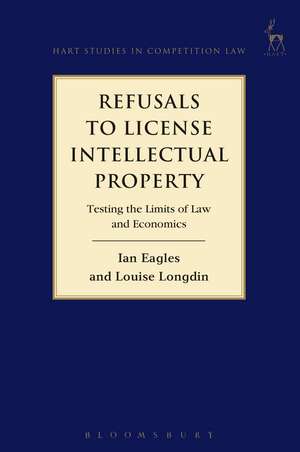Refusals to License Intellectual Property: Testing the Limits of Law and Economics
Autor Ian Eagles, Louise Longdinen Limba Engleză Paperback – 14 dec 2011
Preț: 830.46 lei
Preț vechi: 965.64 lei
-14% Nou
Puncte Express: 1246
Preț estimativ în valută:
158.91€ • 166.68$ • 132.29£
158.91€ • 166.68$ • 132.29£
Carte tipărită la comandă
Livrare economică 01-15 aprilie
Preluare comenzi: 021 569.72.76
Specificații
ISBN-13: 9781841138732
ISBN-10: 1841138738
Pagini: 298
Dimensiuni: 156 x 234 x 22 mm
Greutate: 0.42 kg
Ediția:New.
Editura: Bloomsbury Publishing
Colecția Hart Publishing
Locul publicării:London, United Kingdom
ISBN-10: 1841138738
Pagini: 298
Dimensiuni: 156 x 234 x 22 mm
Greutate: 0.42 kg
Ediția:New.
Editura: Bloomsbury Publishing
Colecția Hart Publishing
Locul publicării:London, United Kingdom
Caracteristici
This book considers how economic analysis affects intellectual property litigation and what this means for the future of effective global competition enforcement.The book covers a highly topical subject and will be an extremely useful resource for those dealing with intellectual property cases in court as well as scholars who are interested in the field.
Notă biografică
Ian Eagles and Louise Longdin hold chairs in law at Auckland University of Technology in New Zealand and are Visiting Professors at the University of New South Wales. Professor Longdin is also Director of the Competition Law and Policy Institute of New Zealand.
Cuprins
1 Framing the Analysis 2 The Uneasy Cohabitation of Law and Economics in Competition Regimes 3 Fault Lines in Competition Policy 4 Intellectual Property and Competition Policy: Constructing the Interface 5 Refusals to License in the United States 6 Europe's Exceptional Circumstances Test 7 Refusals to License in Australia and New Zealand: Parsing the Hints and Silences 8 Canada: Legislative Solutions and Regulatory Bypasses 9 Reintegrating Law and Economics: Perfecting the Art of the Possible
Recenzii
...a very insightful overview of the challenging relationship between competition law and intellectual property law in all major legal systems across the globe. It provides excellent in depth analysis on the subject whose nature at this state of development poses more questions than gives answers, so it's great food for thought and a must-read for any academic doing research in this area.
...this book provides an interesting analysis of the principles underlying the approach of competition law to refusals to license IPRs and why this approach is often flawed from an economics perspective.
...this book provides an interesting analysis of the principles underlying the approach of competition law to refusals to license IPRs and why this approach is often flawed from an economics perspective.
Descriere
Economic analysis rarely appears on the judicial horizon in intellectual property litigation. How this came about and what it means for the future of effective competition enforcement globally are the twin concerns of this book.
